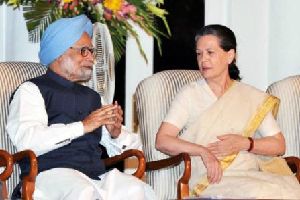
New Delhi, May 23: Marking the third anniversary of the UPA II government, Congress chief Sonia Gandhi on Tuesday put the ruling coalition in poll mode, warning her party and allies that they have two years to get their act together as UPA-2 can hope to renew its mandate in 2014 only on the basis of performance rather than promises.
Her remarks came after Prime Minister Manmohan Singh in his speech acknowledged that people were angry and frustrated over corruption. "We know there is public frustration and anger over the issue of corruption. I wish to assure our people that we are working sincerely to address the issue," the PM said in a candid acknowledgement of the problem which is seen as having sapped the goodwill for the government.
Sonia outlined the task ahead, saying, "We are aware that only two years are left when we will be seeking a new mandate from the people. We are fully aware that the result of that will not depend on our promises but on the nature of work done by us."
The wake up call came as the government utilised a function at Prime Minister Manmohan Singh's residence to rebut the damaging charge that UPA-2 was in the grip of a "policy paralysis" by releasing a report that talked of a robust economy and ambitious welfare schemes.
Responding to questions, the PM also pitched in, saying, "The perception (of a policy paralysis) can be misplaced. It can be corrected by reality. The facts can correct the perception."
The function gave the government an opportunity to showcase its numbers in Parliament with Samajwadi leader Mulayam Singh Yadav finding pride of place next to home minister P Chidambaram. A seat for RJD leader Lalu Prasad as well underlined the coalition's comfortable majority in Lok Sabha.
It was Sonia's speech at the dinner to mark three years of UPA-2 that set the tone on a humid May evening when she said that while "opponents were being loud and aggressive, and leveling irresponsible charges", the government must concentrate on working hard and fulfilling its objectives.
On corruption, the PM said the government was trying to set up Lokpal and make a law for time-bound delivery of public goods and services and judicial accountability. "We are trying to ensure exemplary punishment to the guilty while also ensuring that public servants feel secure in taking bona fide decisions that are in the national interest," he further said.
Congress leaders pointed out that since the last six months of a government's terms are invariably overtaken by the dynamics of elections, the government just about has 18 months to deliver on big issues like corruption and the economy. They interpreted Sonia's speech as a reminder that the window for tackling the challenges of perception of sleaze, as well as a slowing economy and stubborn inflation, is rather small.
Reverses in state and civic polls show that the government has reasons to worry. Although the BJP is also in a disarray, many in Congress feel that voters may decide to punish the incumbent without being concerned about political stability.
However, Sonia, who is also UPA chairperson, struck an upbeat note. "There is no room for disappointment (nirasha) even as the country faces a challenging economic situation," she said, pointing to UPA-2's achievements, particularly those that have benefitted the disadvantaged through health insurance and rural employment guarantee schemes.
Sonia's unambiguous remarks can be seen as a early poll bugle as the government has been immersed in crisis management, with the latest preoccupation being managing the presidential election in the face of conditions imposed by assertive allies like Trinamool Congress.
The well-filled stage would give Congress managers some respite as those on stage represent a comfortable majority in Lok Sabha, enough to ensure the ruling coalition lasts its full term.





Comments
Add new comment